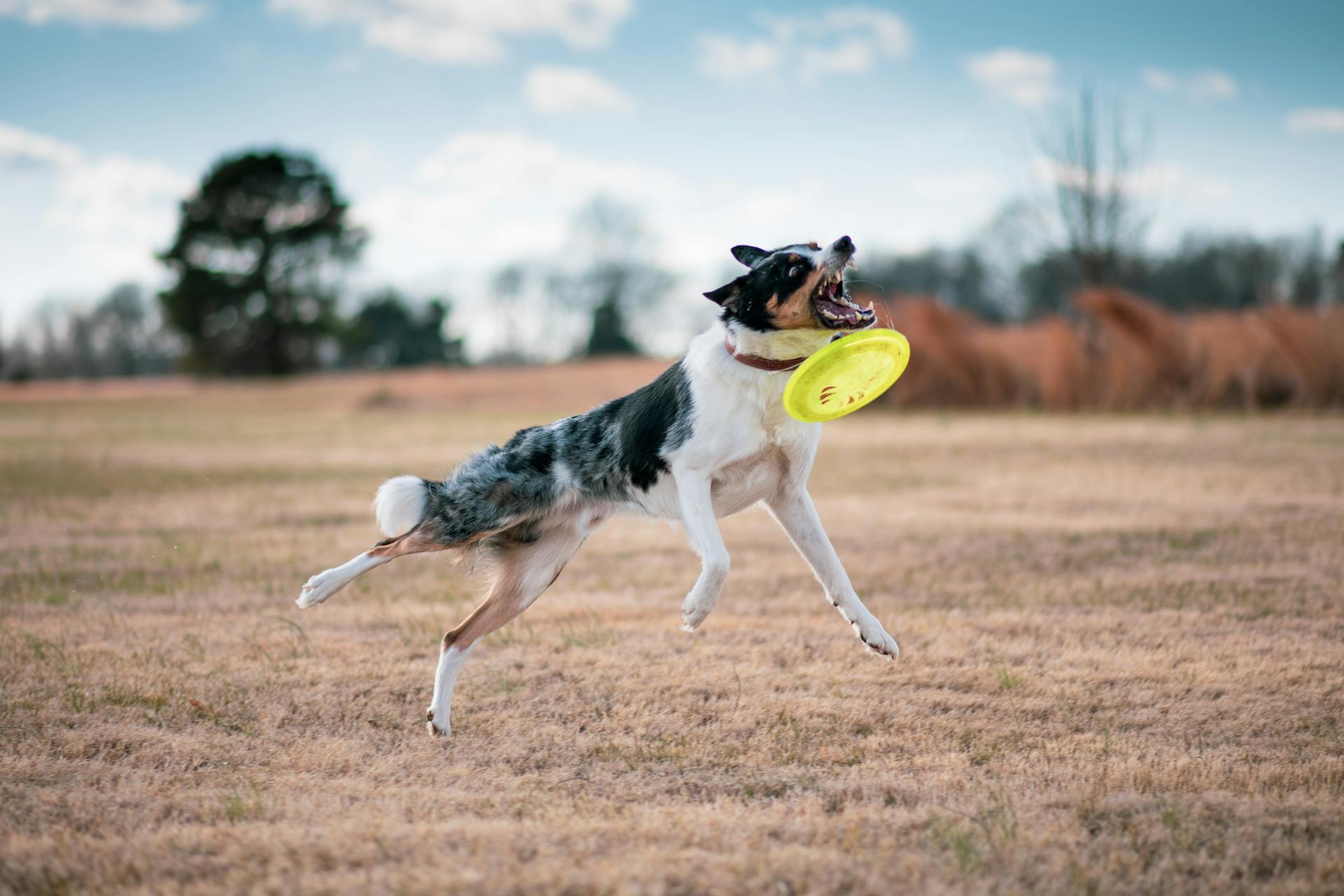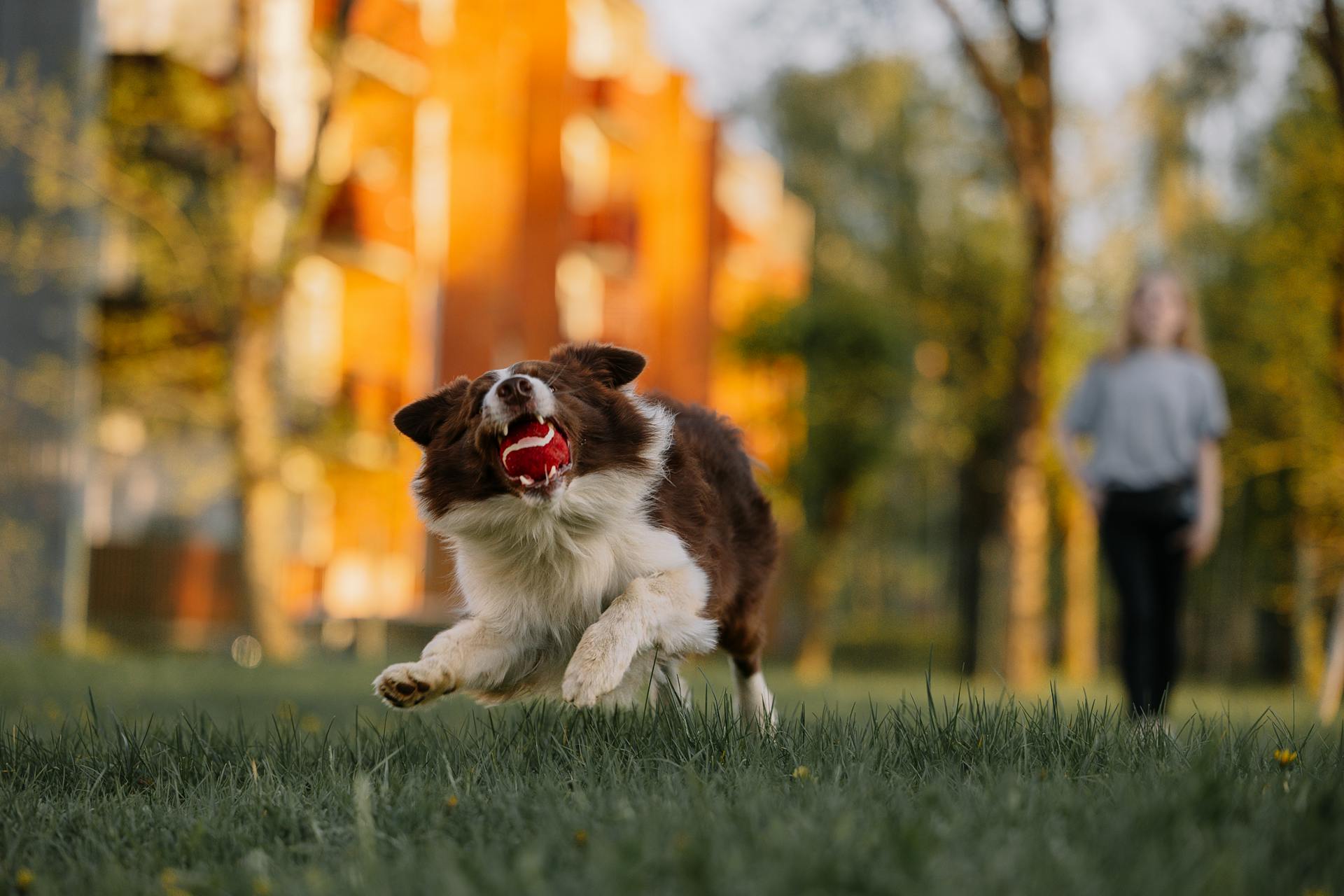
Dogs can catch a human cold or flu, but it's not as simple as catching a cold from a human. Dogs can be infected with the influenza A virus, which is the same virus that causes the flu in humans.
Dogs can also be infected with the canine parainfluenza virus, which is a common cause of kennel cough in dogs. This virus is highly contagious and can be spread through the air when an infected dog coughs or sneezes.
The symptoms of a cold or flu in dogs can be similar to those in humans, including sneezing, coughing, and runny eyes. However, dogs can also exhibit symptoms such as lethargy, loss of appetite, and a decrease in their normal activity level.
If your dog is showing symptoms of a cold or flu, it's essential to take them to the vet as soon as possible to determine the cause and get treatment.
Readers also liked: Can Dogs Catch Influenza a from Humans
Can Dogs Catch a Human Cold?
Dogs can't catch a human cold because there isn't a recognized virus that has been identified as the common cold virus in dogs.
However, dogs can catch viruses that cause cold-like symptoms, which can range in severity.
These viruses are different from the ones that cause human colds, and it's crucial to pay close attention to any symptoms your dog may be experiencing.
Common "cold" viruses rarely transfer from one species to another, so if you have a cold and want to cuddle with your dog, rest easy knowing that your dog is at a very low risk of catching anything from you.
It's worth noting that cases of zoonotic disease - meaning any disease or infection transmissible between pets and humans - are rare.
Discover more: Can Dogs Catch a Human Virus
Treating and Preventing
If your dog has a cold, it's essential to keep them comfortable and hydrated. Have fresh water available at all times to prevent dehydration.
Your vet may recommend antibiotics, cough suppressants, and fluids to help your dog recover. Never give your dog human cold remedies, as they can be highly dangerous.
To prevent the spread of illness, isolate your dog from healthy pets and keep them away from areas where they may come into contact with germs. If your dog has kennel cough, your vet may prescribe antibiotics to fight the infection.
Here are some general tips to help your dog feel better:
- Get their bed or sleeping area ready and let them rest as much as they need to recover.
- Wipe off any discharge from their nose or eyes if you notice it.
- Keep them nice and warm and keep bathroom trips outside short if it's cold.
- Use a humidifier or run a hot shower to help ease congestion.
Symptoms
If your dog is showing symptoms of a cold, such as coughing or wheezing, sneezing, or a runny nose, it's essential to keep an eye on them and seek veterinary care if the symptoms persist or worsen.
Coughing or wheezing can be a sign of a more serious issue, like canine influenza or kennel cough.
Sneezing, on the other hand, can be a symptom of a dog cold, but it can also be a sign of a fungal infection.
A runny nose is a common symptom of a dog cold, but if it's accompanied by labored breathing from congestion, it's a good idea to have your dog checked by a vet.
A unique perspective: Can Reverse Sneezing Kill a Dog

Red, watery eyes can be a sign of a dog cold, but they can also be a symptom of canine distemper.
Lethargy and decreased appetite are two symptoms that can be caused by a dog cold, but they can also be signs of a more serious issue, such as heartworm or roundworm infection.
Fever is a symptom that requires veterinary attention, as it can be a sign of a serious underlying condition.
Here are some common symptoms of a dog cold:
- Coughing or wheezing
- Sneezing
- Runny nose
- Labored breathing from congestion
- Red, watery eyes
- Lethargy
- Decreased appetite
- Fever
Treating
If your dog has a cold, it's essential to keep them comfortable and hydrated. Their bed should be ready and easily accessible so they can rest as much as they need to recover. Fresh water should be available at all times to prevent dehydration.
If your dog is congested, you can try placing them in a room with a humidifier or in the bathroom while you run a hot shower to help loosen up their mucus. This can make it easier for them to breathe and feel more comfortable.

Some common symptoms of dog colds include coughing, sneezing, runny nose, labored breathing from congestion, red and watery eyes, lethargy, decreased appetite, and fever. If your dog is experiencing any of these symptoms, it's crucial to contact your veterinarian for guidance.
Here are some key things to keep in mind when caring for a dog with a cold:
- Isolate them from healthy pets to prevent the spread of illness.
- Keep them warm and comfortable.
- Provide plenty of fresh water.
- Wipe away any discharge from their nose or eyes.
- Consider using a humidifier or running a hot shower to help loosen up their mucus.
If your dog's health doesn't improve or you notice any additional symptoms, be sure to check in with your veterinarian for further guidance.
Flu Prevention
You don't have to worry about getting the flu from your dog, because the viruses that cause the common cold and seasonal flu are specifically adapted to living in people, not dogs.
Dogs have their own version of the flu, called canine influenza, which is a separate type of influenza that can infect dogs but not humans.
The risk of getting COVID from your dog is also very low, according to the CDC, which says there's no evidence that animals play a significant role in spreading the virus that causes COVID-19.
Discover more: Can Dogs Catch Covid from Humans Uk
Understanding the Risks
Dogs are at a very low risk of catching a cold or flu from their human family members.
Cases of zoonotic disease, where pets and humans can transmit diseases to each other, are rare.
You can rest easy knowing that your dog is unlikely to catch anything from you if you have the sniffles and want to cuddle with your dog.
Transmission from Humans
Dogs are at a very low risk of catching anything from humans, including the common cold, because common "cold" viruses rarely transfer from one species to another.
While cases of zoonotic disease, or disease transmissible between pets and humans, are rare, it's always a good idea to keep an eye out for any unusual symptoms in your dog.
Common "cold" viruses, such as rhinovirus, are responsible for more than half of all human cold cases, but there is no recognized virus that has been identified as the common cold virus in dogs.
So, if you have the sniffles and want to cuddle with your dog, rest easy knowing that your dog is at a very low risk of catching anything from you.
Intriguing read: Can Dogs Catch Herpes from Humans
What Is a Human Cold?
A human cold is a viral infection that affects the upper respiratory tract, specifically the nose, throat, and lungs.
Symptoms can include a runny nose, sneezing, coughing, and a sore throat.
The common cold is caused by a variety of viruses, with rhinoviruses being the most prevalent.
In most cases, the cold virus enters the body through the eyes, nose, or mouth.
The cold virus can be spread through contact with an infected person's mucus, saliva, or other bodily fluids.
Colds are highly contagious and can be spread through the air when an infected person talks, coughs, or sneezes.
The incubation period of a cold, the time between exposure to the virus and the onset of symptoms, can range from 1 to 3 days.
The symptoms of a cold can last anywhere from 7 to 14 days.
Explore further: How Is Kennel Cough Spread
Common vs. Kennel Cough
Kennel cough is a highly contagious disease that dogs can catch, and it's a more severe cause of cold-like symptoms in dogs. It's essential to know the difference between common cold and kennel cough to provide the right care for your furry friend.
Worth a look: Can Kennel Cough Kill a Dog
Kennel cough targets the upper respiratory system and causes inflammation in the trachea, which can be caused by bacteria or a virus. This infection is easily spread by dogs, hence the name kennel cough.
Common signs of kennel cough in dogs include mild fever, runny nose, dry, harsh coughing, watery eyes, decreased appetite, trouble breathing, nasal discharge, severe congestion, and fatigue. These symptoms can be similar to those of a common cold, but kennel cough is more severe.
Kennel cough's most prominent symptom is usually dry, harsh coughing, which may end in retching or gagging. If you notice that your dog is experiencing a dry, harsh cough or they are retching or gagging, contact your vet as soon as possible.
Here are some key differences between common cold and kennel cough:
- Kennel cough is a more severe cause of cold-like symptoms in dogs.
- Kennel cough targets the upper respiratory system and causes inflammation in the trachea.
- Kennel cough can be caused by bacteria or a virus.
Frequently Asked Questions
Will my dog get sick from the cold?
Yes, dogs can get sick from cold weather, just like humans, and common illnesses include hypothermia, frostbite, colds, and kennel cough. Learn how to protect your furry friend from these winter woes.
Sources
- https://www.purina-arabia.com/articles/dogs/health/respiratory/dog-colds-and-flu
- https://www.animalclinicofwoodruff.com/pet-blog/vaccinations/when-pets-get-the-sniffles-understanding-cold-symptoms-in-dogs-and-cats
- https://www.bil-jac.com/the-dog-blog/posts/can-dogs-catch-a-cold/
- https://www.pawlicy.com/blog/do-dogs-get-colds/
- https://www.houstonmethodist.org/blog/articles/2021/apr/can-my-dog-get-me-sick/
Featured Images: pexels.com


